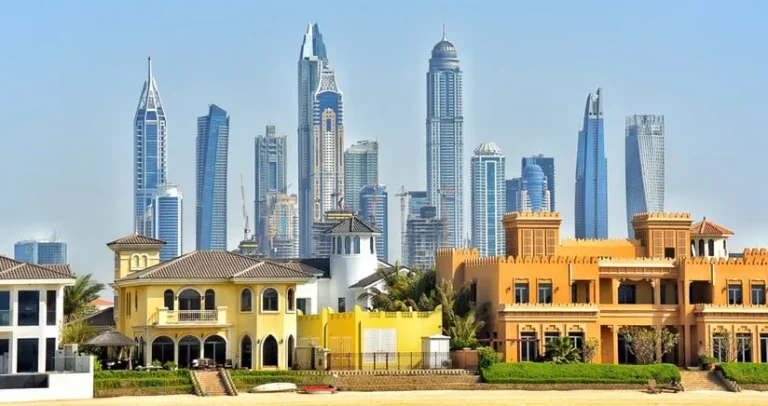Dubai has become a world hotspot for property investors because the property rental yield is one of the most rewarding in the world. With cities in Europe and the North American region experiencing shrinking margins, Dubai has persisted in providing stable and higher returns. It is an outstanding destination due to a combination of policies favouring investment, tax concessions, and a healthy level of demand by expats. In this article, we inquire why rental yields in Dubai have always beaten international real estate markets and what has fueled the trend.
1. Dubai’s Strong Rental Yield Performance vs. Global Markets
As the key indicator of interest to property investors, the rental yield in Dubai is among the highest in the world. In Q1 2025, average gross yields are about 7%, which is significantly more than 24% common in large Western markets. Downtown Dubai studios can fetch up to 7.9%; the general apartment yields stand at 5.9-6.1%. Dubai Marina community provides approximately 6.5-6.6% on studios and apartments. The first indications are that the Islands offer Waterfront luxury areas at an estimated 8-10% higher than short-term holiday rentals when the operations are fully in business.
2. Zero Property and Rental Income Tax
One of the exceptional policies of Dubai is its zero property and rental income tax, a huge asset in terms of net yields to house owners. Conversely, big cities like London, New York, and Sydney impose high taxes on rentals and property ownership.
Capital and profits are fully repatriated by the investors and the capital gains tax, making the net yields of the investors in Dubai one of the richest globally. Moreover, the fact that the capital gains tax is not present also enhances the economic returns as investor can keep a bigger part of their income.
3. Growing Population and Demand for Rentals
The populations in Dubai report a swift increase, which amplifies the demand for rentals, particularly among expatriates. By early 2025, the emirate will have a population of nearly 3.84 million, of whom expatriates constitute almost 85-92% of the residents. With more than 51000 new inhabitants in Q1 2025, this inflow is projected to see the population surpassing 4M by the end of 2026.
The rental market in Dubai is enjoying a stable and continuously rising rate, which is fed chiefly by an ever-swelling inflow of professionals and entrepreneurs, who are choosing to take up residence in the city. A sustained rental demand is caused by an uptick of professionals and entrepreneurs preferring to rent in Dubai due to its long-term visa changes, such as the Golden Visa.
4. Short-Term Rental Boom via Tourism and Expo Legacy
In 2023, Dubai received 17.15M foreign visitors, as per the Dubai Department of Economy and Tourism. The booming tourism industry has greatly increased the short-term rental market. Rental apartments on Airbnb and Booking.com provide investors with returns of 10-12%, especially in Downtown Dubai, Marina, and Palm Jumeirah.
Such practice is likely to extend after Expo 2020, with Dubai still being a tourism magnet and a business center of the Middle East. The fact that it has continually remained a lively tourist destination, coupled with its position as the Middle-Eastern hub in terms of trade and finance, provides attractions means that the number of visitors, investors, and entrepreneurs will continue to increase.
5. Affordable Luxury and Competitive Property Prices
The Dubai real estate market is marked by affordability, profitability of renting, and the ability to grow rapidly. It is very cheap compared to most cities in the world (e.g., London—6,260 psf; New York—8,170 psf) and is quoted at 550 dollars per square foot in Dubai until 2024. This low-cost and tax-free regime, together with international-standard infrastructure, has earned Dubai an ultimate place in investment value and returns.
6. Investor-Friendly Regulations and Transparency
Dubai Land Department (DLD) has been following up on various reforms to enhance investor transparency and protection. All renting agreements are registered by Ejari, which makes them legally secure for the landlords. Secondly, the Real Estate Regulatory Agency (RERA) regulates the pricing of the rental index, reducing cases of tenant conflicts and maintaining the market’s stability.
Dubai is highly regulated and property market-friendly, where smart governance, digital contract management, and escrow account provisions in off-plan projects make it the most regulated property market in the region.
7. Rising Interest in Projects in Dubai Islands
Rental demand is also being boosted by projects in the Dubai Islands. There are residential and hospitality investments in these islands where beachfront living is near the city center. Their mixed-use communities should provide strong short-term rental incomes after being completed, particularly where retail stores, tourism, and leisure areas are being incorporated.
Capital appreciation and high rental performance in the future are factors that early investors in these projects will enjoy as infrastructure evolves in the future. These continuous elevations are not only going to increase the general marketability of the area but also guarantee the long term keepability of rental demand
8. Variety of Properties to Match Every Investment Strategy
Be it the studios in the International City or the luxury penthouses of the Business Bay, the real estate company of Dubai has a variety of asset types that all sorts of investors can invest in. The freedom to invest in off-plan apartments, ready-to-move residential apartments/ short-stay serviced apartments allows the landlords to maximize returns depending on their risk and investment horizon.
Builders currently give post-handover payment packages, where the investor can begin receiving a rental income much prior to making the total payment, which is a privilege not offered in worldwide.
9. Infrastructure and Connectivity Improvements
Dubai is also spending on infrastructural development, including new metro map and lines, bridges, and airports. It makes some destinations more appealing but also can justify higher rents. Properties close to metro stations, wide roads, and business centers attract quality tenants and fetch high rents.
Newer locations such as Dubai South, Meydan, and Dubai Island are being developed because they are close to major economic centers and have new transport connections. Developers and investors are showing rising interest in these places because they are well incorporated with new and advanced transportation systems, such as improved road networks, extended metros, and airport links.
10. Stable Political and Economic Environment
UAE is a politically stable and economically progressive environment. Dubai offers a safe real-estate environment with efforts such as Vision 2030 and a less oil-reliant diversified economy.
The investor-friendly policy and frequent updates to the visas of investors and residents lead to a rich rental economy, particularly compared to the economic or regulatory instability in other areas.
What Is a Good Rental Yields in Dubai in 2025?
A rental yield of 5% to 7% is considered standard in Dubai for apartments. However, short-term rentals and waterfront properties can go up to 10–12%, making Dubai highly competitive compared to global markets.
Is Rental Income in Dubai Tax-Free for Foreign Investors?
Yes, Dubai offers zero property and rental income tax, meaning investors can retain the entire profit from rental properties. There’s no capital gains tax either, which further increases net returns.
Which Areas in Dubai Offer the Best ROI on Rentals?
Top ROI areas include Downtown Dubai, Dubai Marina, Palm Jumeirah, and Dubai Islands. These places attract both tourists and professionals, making them ideal for both long-term and short-term rental strategies.
Is It Better to Invest in Short-Term or Long-Term Rentals in Dubai?
If your goal is higher monthly returns, short-term rentals in tourist-heavy areas like Marina or Palm Jumeirah are better. For stable income and lower management effort, long-term rentals in Business Bay or JVC are preferred.

